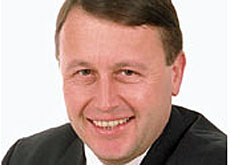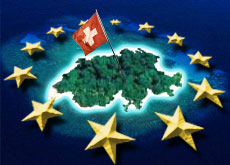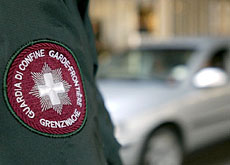Austrian MEP predicts Swiss membership of EU

The European Union will become the world's largest trading bloc with a population of over 450 million when ten new states join on May 1.
Austrian member of the European Parliament Paul Rübig believes that Switzerland – which is not in the EU – could soon choose to renew its membership application, which is on hold.
He says this would be more likely if other traditionally eurosceptic countries such as Norway entered the EU over the next couple of years.
In the meantime Switzerland is negotiating a second set of bilateral agreements to bring it closer to the EU.
Rübig told swissinfo that membership had allowed Austria to play a vital role in the Union, and he insisted that Switzerland would have nothing to fear from joining.
swissinfo: Does it really matter whether Switzerland is a member of the EU – given that at the moment it is negotiating a second set of bilateral agreements as an alternative to full membership?
Paul Rübig: I think it makes a great deal of difference whether or not a country is a member of the EU.
In almost ten years as a member, Austria has learned that it is much more beneficial for the country to be able to play an active part within the European institutions.
We can negotiate with everybody. We have the power to vote, and that means we can influence European policy decisions.
That allows us to protect and represent Austrian interests, and as a member with around 400 people in Brussels we can wield a lot more influence than a non-member with just one ambassador.
swissinfo: But opponents here in Switzerland would argue that Swiss membership of the EU is incompatible with this country’s system of direct democracy, which allows all policy decisions to be put to a nationwide vote.
P.R: Firstly democracy means you need majorities. The EU is governed by the principle of subsidiarity, so the Union only decides on areas that transcend national politics.
Secondly, Swiss direct democracy would not be overruled by EU membership. How the Swiss reach a decision on a policy area would be up to the Swiss themselves.
At the European level Switzerland would have to go along with majority decisions. As a member though, it could have a say in influencing those decisions and representing Swiss interests.
That is what Austria has learned to do quite well.
swissinfo: What about financial considerations? Switzerland would be a net contributor. And opponents claim its high standard of living as well as its environmental and health policy would suffer.
P.R.: Austria is also a net payer. But when assessing what that means you also have to look at the return there is on an investment, and Austria has gained quite a lot from being a member.
The liberalisation process in energy, telecoms and transport has given us the chance to develop a much more competitive system. Our exports to the new member states over the past ten years have increased by more than €3 billion, and that has also resulted in ten of thousands of new jobs at home.
swissinfo: Do you think Switzerland will ever be a member of the EU?
P.R: My personal opinion is that Switzerland will very soon be a member of the EU.
This latest round of enlargement sees ten countries that have taken the decision that it’s better for them to join the EU.
In the near future we can probably also expect Norway, Iceland, Bulgaria and Romania to take a similar decision.
I think one of the main debates in Switzerland over the next couple of years will be whether the country wants to be part of the European democratic process or not.
That’s a decision that only the Swiss people can make – but it needs a debate that shows how both the EU and European democracy really work.
swissinfo: You say that Switzerland could play as much of a role in the EU as Austria. But let’s face it: the only countries that really wield any power are France and Germany. The smaller countries don’t have much influence, do they?
P.R.: I have been a MEP for eight years and I have learned that it’s not important whether you come from one of the EU’s smaller or larger countries.
Normally political majorities are built around common interests such as the environment or liberalisation.
With more than 1,000 policy decisions every year the make-up of majorities changes all the time and cuts across both parties and countries.
And I think that shows that democracy in Europe works well and that it’s pretty well developed.
swissinfo-interview: Jonathan Summerton
Paul Rübig is an Austrian MEP and vice chairman of the European Parliament’s delegation for relations with Switzerland, Iceland and Norway.
Austria was one of three countries to join the EU in its fourth round of expansion in 1995.
It first held the six-month rotating presidency of the EU in the second half of 1998 and is due to take over again at the beginning of 2006.
Austria has a population of 8.1 million compared with Switzerland’s 7.2 million.
The birth of the modern-day EU can be traced back to the 1957 Treaty of Rome which set up the European Economic Community (EEC) and the European Atomic Energy Community (Euratom).
The original six members were Belgium, France, Germany, Italy, Luxembourg and the Netherlands.
The first round of expansion came in 1973 with the entry of Britain, Ireland and Denmark.
In 1981 Greece became the European Community’s 10th member state, and in 1986 Portugal and Spain joined.
The 1991 Maastricht treaty on European Union paved the way for monetary union and included a chapter on social policy. It came into effect in 1993.
The most recent round of enlargement came in 1995 with the entry of Austria, Finland and Sweden.

In compliance with the JTI standards
More: SWI swissinfo.ch certified by the Journalism Trust Initiative












You can find an overview of ongoing debates with our journalists here . Please join us!
If you want to start a conversation about a topic raised in this article or want to report factual errors, email us at english@swissinfo.ch.